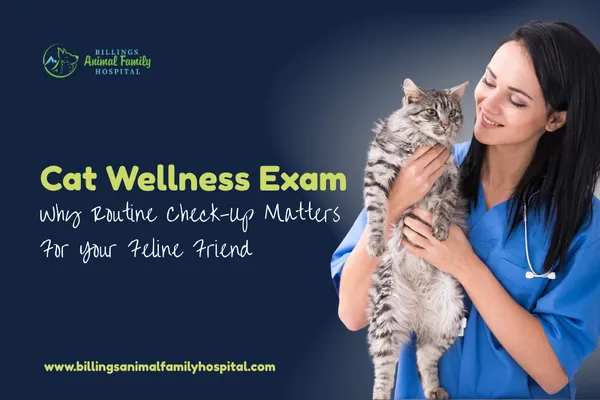
Why Cat Wellness Exams Matter | Billings Animal Family Hospital
Cat Wellness Exam: Why Routine Check-Up Matters For Your Feline Friend
Despite what your independent feline might tell you, routine cat wellness exams are essential to their health and longevity. Skipping these visits can leave your beloved cat vulnerable to a wide range of health concerns, including infectious diseases, weight issues, dental disease, internal and external parasites, and more.
Many cat owners, especially those with indoor pets, believe that if their cat “looks healthy,” there’s no need for regular vet visits. Unfortunately, that assumption can lead to missed opportunities for early detection and prevention.
In this post, we’ll explore why routine veterinary care is critical for your cat’s well-being and how you can prepare your cat before each visit.
What You'll Find In This Post
Cat Wellness Exam: Why Routine Check-Up Matters For Your Feline Friend
A common scenario: When feline health issues go unnoticed
Why annual or biannual cat wellness exams with your vet are essential
1. Early detection saves lives
2. Weight monitoring & nutrition guidance
4. Parasite control & fecal testing
5. Vaccination & preventive care
What’s included in a cat wellness exam?
How to prepare your cat for annual wellness exams
1. How often should my cat get a pet wellness exam?
2. Is a wellness exam necessary for indoor cats?
3. What is the average cat wellness exam cost?
4. How should I prepare my cat for a wellness exam?
5. Where can I get a cat wellness exam near me?
Visit your veterinarian or animal hospital for a wellness exam today

A common scenario: When feline health issues go unnoticed
Imagine a pampered indoor cat—vocal, picky, and clearly in charge of her home. Her family adores her and assumes she’s healthy because she’s always been inside, got her kitten vaccinations, and still plays now and then. Over the years, they’ve skipped regular cat wellness exams, thinking there was no real need.
But then, subtle changes begin to appear:
An increasingly finicky appetite
Constant thirst
Noticeable weight loss
Concern grows, and the family finally schedules a vet appointment. After a thorough physical examination, the veterinarian discovers:
Severe gingivitis and a fractured tooth
Signs of a urinary tract infection
Elevated white blood cells—indicating an active infection
High glucose levels and sugar in the urine—early signs of diabetes
This scenario plays out in many veterinary clinics across the country. Cats like this one often require urgent care to address pain, infections, and chronic conditions that could have been managed or prevented with earlier detection through routine pet wellness exams.
Thankfully, with proper veterinary care, cats in these situations can recover and thrive again. But these situations could be avoided. No cat should have to suffer silently from preventable conditions simply because their symptoms went unnoticed or their wellness visits were delayed.

Why annual or biannual cat wellness exams with your vet are essential
Even if your cat appears healthy, routine cat wellness exams are key to preventing serious health issues. These visits allow your veterinarian to catch problems early and address any concerns you may have.
1. Early detection saves lives
Cats are experts at hiding pain or illness. A feline wellness exam helps your vet detect early signs of disease that you may overlook at home. Conditions like diabetes, kidney disease, parasite infestations, or dental issues are best treated early, before symptoms worsen.
2. Weight monitoring & nutrition guidance
During a regular wellness exam, your vet evaluates your pet’s body condition. Obesity can lead to diabetes, arthritis, and even some cancers. Your veterinarian may recommend a personalized diet plan based on your cat’s weight, age, and activity level.
3. Dental care & oral health
Dental disease is prevalent in adult cats. Routine examinations and professional cleanings can prevent pain, tooth loss, and infections. In our scenario earlier, a fractured tooth went unnoticed for years—routine exams could have spared her pain and complications.
4. Parasite control & fecal testing
Even indoor cats are at risk of intestinal parasites, fleas, and ticks. A wellness check-up often includes fecal exams to identify hidden infestations. Vets also recommend year-round parasite control, tailored to your cat’s lifestyle.
5. Vaccination & preventive care
Vaccines protect your feline from common and life-threatening diseases. During your cat’s wellness visit, the veterinarian reviews vaccination history and updates essential shots like FVRCP, rabies, or FeLV as needed.

What’s included in a cat wellness exam?
A standard cat wellness exam typically includes:
A full physical examination
Weight and body condition assessment
Oral and dental evaluation
Fecal testing and parasite screening
Blood work (especially for older cats or those with symptoms)
Vaccination review and updates
Behavior and lifestyle discussion
Tailored health and nutrition advice
Wondering about the cat wellness exam cost? The price can vary based on your cat’s age and the services included. For a detailed estimate, speak with your local vet in Billings, MT.

How to prepare your cat for annual wellness exams
Wellness visits can be stressful for some cats, but with a bit of preparation, you can make the experience smoother for both of you.
Get your cat comfortable with their carrier. Leave it out in a familiar space days before the visit. Add soft bedding, treats, or toys to create a positive association.
Schedule during quiet times. Book your appointment when your home is calm, and your cat is usually more relaxed.
Take note of any changes. Write down behaviors, eating habits, or any concerns you may have to discuss with your veterinarian during the exam.
Stay calm and reassuring. Cats can pick up on your energy, so speak softly and stay relaxed during transport and at the clinic.
With these steps, your cat's wellness exam can be a low-stress, positive step in supporting your pet’s long-term health.

Frequently asked questions
1. How often should my cat get a pet wellness exam?
At a minimum, cats should have an annual wellness exam. Senior cats or those with ongoing health concerns may need biannual visits.
2. Is a wellness exam necessary for indoor cats?
Yes! Indoor cats can still suffer from obesity, dental disease, or parasite infections. These conditions are not always visible until advanced stages.
3. What is the average cat wellness exam cost?
The cost can range depending on your cat’s age and the required diagnostics or treatments. A basic check-up is a small price to pay for long-term health.
4. How should I prepare my cat for a wellness exam?
Bring your cat in a secure carrier. Make a list of any behavioral changes, eating habits, or health concerns you’ve noticed.
5. Where can I get a cat wellness exam near me?
If you're in Billings, schedule a cat wellness exam at Billings Animal Family Hospital. Our compassionate team is here to care for your feline family member.

Visit your veterinarian or animal hospital for a wellness exam today
Your cat may not be able to tell you when something’s wrong, but routine cat wellness exams give them a voice. These visits are proactive steps that protect your feline from preventable diseases, manage chronic conditions early, and improve quality of life.
At Billings Animal Family Hospital, our dedicated team is here to support you with expert care, compassion, and guidance at every life stage. Don’t wait for visible symptoms—schedule your cat’s next wellness exam today by calling (406) 245-4772 or contacting us online.



